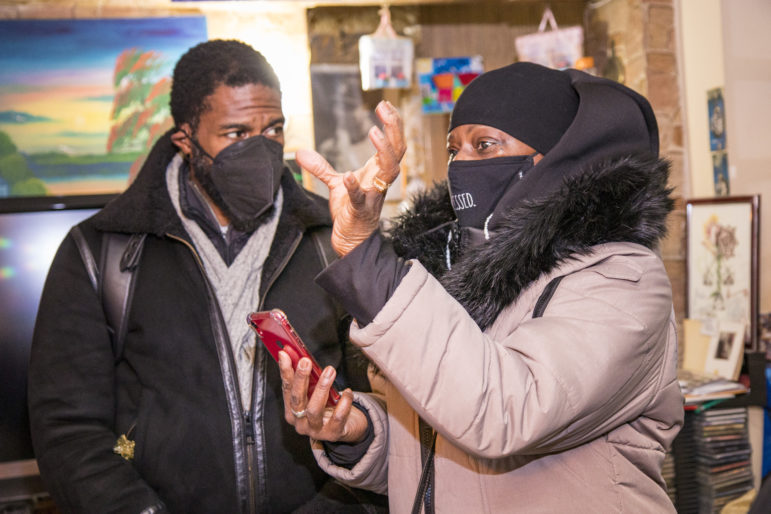NYCHA reported a decrease in heat outages and shorter restoration times during the 2022-2023 winter heating season, which concluded Friday, citing millions of dollars invested in upgraded boiler systems and newly installed hot water heaters and heat pumps.

Caroll Andrewsk/NYC Public Advocate
Public Advocate Jumaane Williams with a tenant at Red Hook Houses, bundled up during a heat outage in 2022.NYCHA reported a decrease in heat outages and shorter restoration times during the 2022-2023 winter heating season, which concluded Friday, citing millions of dollars invested in upgraded boiler systems and newly installed hot water heaters and heat pumps.
Between Oct. 1 and May 31—what’s known as “heat season”—New York City property owners must heat units to at least 68 degrees between 6 a.m. and 10 p.m. when the outside temperature falls below 55 degrees, and at a minimum of 62 degrees between 10 p.m. and 6 a.m. no matter the temperature outside.
This winter, public housing developments experienced 587 heat outages, down 21 percent from 747 outages the year before, according to NYCHA.
Combined, heat and hot water disruptions decreased 9 percent compared to the previous heating season—a year in which overall utility outages at NYCHA spiked—and took an average of eight hours to be restored.
That’s faster than both the 12-hour time frame that heating inquiries need to be addressed by under Department of Housing and Urban Development (HUD) rules, and the 24 hours required of private landlords, NYCHA noted in announcing the new numbers.
Officials attributed the improved performance in part to an investment of $78.8 million this year toward heating infrastructure—city and federal funding that helped provide more consistent warmth at 10 housing developments across the Bronx, Brooklyn and Manhattan.
In a statement, NYCHA Interim CEO Lisa Bova-Hiatt said those upgrades are an example of the housing authority’s “efforts to improve the delivery of these crucial services.”
“As a pillar of the 2019 HUD Agreement, heat is a paramount quality of life concern for NYCHA residents,” Bova-Hiatt said.
The monitor agreement that NYCHA entered with HUD those few years ago ensures health and safety concerns are being actively rectified, and included a “Heat Action Plan” for addressing persistent outages. During the 2017-2018 heat season before the monitor agreement was put in place, it took NYCHA an average of 30 hours to restore an outage.
Heating infrastructure projects have been funded through the Council’s City Capital Action Plan, which earmarked $2.2 billion for NYCHA.
Some additional projects are being funded through Energy Performance Contracts (EPC) which take savings from lower energy consumption to reimburse the cost of implementing new energy conservation tools. The two contracts, which cost $103 million, are being used to update lighting and heating systems across 41 NYCHA developments.
The investment is also part of the Sustainability Agenda unveiled in September 2021, which includes goals such as reducing greenhouse gas emissions by 80 percent by 2050. NYCHA says it currently has $360 million energy efficiency construction projects in the works.








